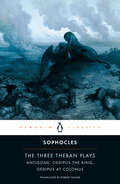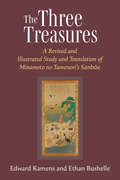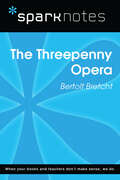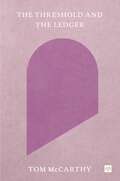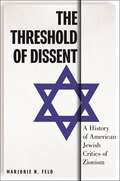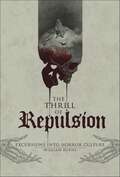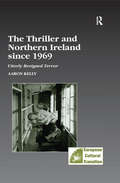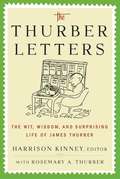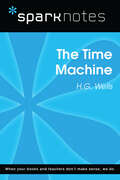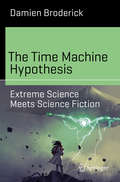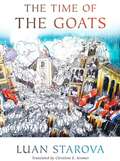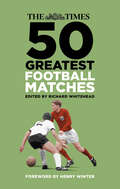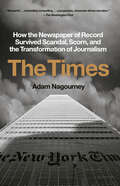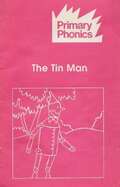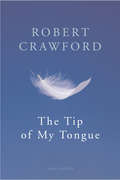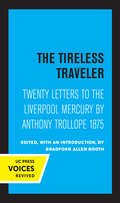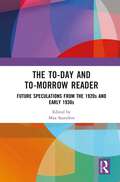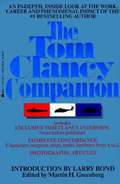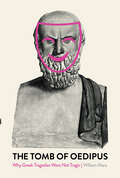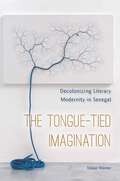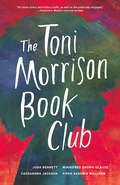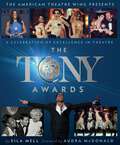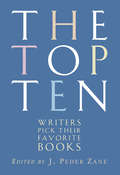- Table View
- List View
The Three Sustainabilities: Energy, Economy, Time
by Allan StoeklBringing the word sustainability back from the brink of cliché—to a substantive, truly sustainable future Is sustainability a hopelessly vague word, with meager purpose aside from a feel-good appeal to the consumer? In The Three Sustainabilities, Allan Stoekl seeks to (re)valorize the word, for a simple reason: it is useful. Sustainability designates objects in time, their birth or genesis, their consistency, their survival, their demise. And it raises the question, as no other word does, of the role of humans in the survival of a world that is quickly disappearing—and perhaps in the genesis of another world. Stoekl considers a range of possibilities for the word, touching upon questions of object ontology, psychoanalysis, urban critique, technocracy, and religion. He argues that there are three varieties of sustainability, seen from philosophical, cultural, and economic perspectives. One involves the self-sustaining world &“without us&”; another, the world under our control, which can run the political spectrum from corporatism to Marxism to the Green New Deal; and a third that carries a social and communitarian charge, an energy of the &“universe&” affirmed through, among other things, meditation and gifting. Each of these carves out a different space in the relations between objects, humans, and their survival and degradation. Each is necessary, unavoidable, and intimately bound with, and infinitely distant from, the others.Along the way, Stoekl cites a wide range of authors, from philosophers to social thinkers, literary theorists to criminologists, anthropologists to novelists. This beautifully written, compelling, and nuanced book is a must for anyone interested in questions of ecology, energy, the environmental humanities, contemporary theories of the object, postmodern and posthuman aesthetics, or religion and the sacred in relation to community.
The Three Theban Plays: Antigone; Oedipus the King; Oedipus at Colonus
by Sophocles Bernard Knox Robert FaglesThe heroic Greek dramas that have moved theatergoers and readers since the fifth century B.C.Towering over the rest of Greek tragedy, the three plays that tell the story of the fated Theban royal family—Antigone, Oedipus the King and Oedipus at Colonus—are among the most enduring and timeless dramas ever written. Robert Fagles's authoritative and acclaimed translation conveys all of Sophocles's lucidity and power: the cut and thrust of his dialogue, his ironic edge, the surge and majesty of his choruses and, above all, the agonies and triumphs of his characters. This Penguin Classics edition features an introduction and notes by the renowned classicist Bernard Knox.For more than seventy years, Penguin has been the leading publisher of classic literature in the English-speaking world. With more than 1,700 titles, Penguin Classics represents a global bookshelf of the best works throughout history and across genres and disciplines. Readers trust the series to provide authoritative texts enhanced by introductions and notes by distinguished scholars and contemporary authors, as well as up-to-date translations by award-winning translators.
The Three Treasures: A Revised and Illustrated Study and Translation of Minamoto no Tamenori's Sanboe (Michigan Monograph Series in Japanese Studies #97)
by Edward Kamens Ethan BushelleWhen the young Princess Sonshi became a Buddhist nun in the year 984, a scholar-official of the royal court was commissioned to create a guide to the Buddhist religion that would be accessible for her. He did so in the form of the illustrated works of fiction (monogatari) that appealed to women readers of her time and class. The text has survived in later manuscripts; the illustrations, if they ever existed, have not. This revised translation recreates Sonshi’s experience of receiving this multimedia presentation, with illustrations selected to help contemporary readers visualize its content and essays that provide context on the religious and cultural experience of the author. The Three Treasures is a unique document that opens a window onto the world of Buddhist religious experience—especially for women—in high classical Japan, the time of Sei Shōnagon’s Pillow Book and Murasaki Shikibu’s Tale of Genji.
The Threepenny Opera (SparkNotes Literature Guide Series)
by SparkNotesThe Threepenny Opera (SparkNotes Literature Guide) by Bertolt Brecht Making the reading experience fun! Created by Harvard students for students everywhere, SparkNotes is a new breed of study guide: smarter, better, faster. Geared to what today's students need to know, SparkNotes provides: *Chapter-by-chapter analysis *Explanations of key themes, motifs, and symbols *A review quiz and essay topicsLively and accessible, these guides are perfect for late-night studying and writing papers
The Threshold and the Ledger
by Tom McCarthyA timely exploration of Austrian writer Ingeborg Bachmann by Booker-shortlisted author Tom McCarthy.Since her untimely death in 1973, Ingeborg Bachmann has come to be regarded as one of the twentieth century&’s most important writers. Unpacking a single Bachmann poem, novelist Tom McCarthy latches onto two of its central terms — the eponymous threshold and ledger — and takes off on a line of flight: through the work of Franz Kafka, David Lynch, Anne Carson, Sappho and Shakespeare.Can writing be understood as an experience of the threshold, a limit- or boundary- state? A condition of ecstasy or ec-stasis, standing outside of oneself? With identity ruptured and surpassed, how and by whom might such experience be recorded?Appearing on the eve of Bachmann&’s centenary year, McCarthy&’s book argues for the centrality of her vision to the very act of literature itself.
The Threshold of Dissent: A History of American Jewish Critics of Zionism (Goldstein-Goren Series in American Jewish History)
by Marjorie FeldExplores the long history of anti-Zionist and non-Zionist American JewsThroughout the twentieth century, American Jewish communal leaders projected a unified position of unconditional support for Israel, cementing it as a cornerstone of American Jewish identity. This unwavering position served to marginalize and label dissenters as antisemitic, systematically limiting the threshold of acceptable criticism. In pursuit of this forced consensus, these leaders entered Cold War alliances, distanced themselves from progressive civil rights and anti-colonial movements, and turned a blind eye to human rights abuses in Israel. In The Threshold of Dissent, Marjorie N. Feld instead shows that today’s vociferous arguments among American Jews over Israel and Zionism are but the newest chapter in a fraught history that stretches from the nineteenth century. Drawing on rich archival research and examining wide-ranging intellectual currents—from the Reform movement and the Yiddish left to anti-colonialism and Jewish feminism—Feld explores American Jewish critics of Zionism and Israel from the 1880s to the 1980s. The book argues that the tireless policing of contrary perspectives led each generation of dissenters to believe that it was the first to question unqualified support for Israel. The Threshold of Dissent positions contemporary critics within a century-long debate about the priorities of the American Jewish community, one which holds profound implications for inclusion in American Jewish communal life and for American Jews’ participation in coalitions working for justice.At a time when American Jewish support for Israel has been diminishing, The Threshold of Dissent uncovers a deeper—and deeply contested—history of intracommunal debate over Zionism among American Jews.
The Thrill of Repulsion: Excursions into Horror Culture
by William BurnsA collection of lists, reviews, and interviews about the horror genre in film and beyondIncludes categorical lists and in-depth articles covering horror movies, literature, television, graphic novels, and musicHorror is a dominant form of cultural expression in the 20th/21st centuries
The Thriller and Northern Ireland since 1969: Utterly Resigned Terror (Studies in European Cultural Transition #Vol. 28)
by Aaron KellyFor the past 30 years, the so-called 'Troubles' thriller has been the dominant fictional mode for representing Northern Ireland, leading to the charge that the crudity of this popular genre appropriately reflects the social degradation of the North. Aaron Kelly challenges both these judgments, showing that the historical questions raised by setting a thriller in Northern Ireland disrupt the conventions of the crime novel and allow for a new understanding of both the genre and the country. Two essays on crime fiction by Walter Benjamin and Berthold Brecht appear here for the first time in English translation. By demonstrating the relevance of these theorists as well as other key European thinkers such as Antonio Gramsci, Louis Althusser, and Slavoj Zizek to his interdisciplinary study of Irish culture and the crime novel, Kelly refutes the idea that Northern Ireland is a stagnate anomaly that has been bypassed by European history and remained impervious to cultural transformation. On the contrary, Kelly's examination of authors such as Jack Higgins, Tom Clancy, Gerald Seymour, Colin Bateman, and Eoin McNamee shows that profound historical change and complexity have characterized both Northern Ireland and the thriller form.
The Thurber Letters
by Harrison Kinney Rosemary A. ThurberThough he died more than forty years ago, James Thurber remains one of America's greatest and most enduring humorists, and his books -- for both adults and children -- remain as popular as ever. In this comprehensive collection of his letters -- the majority of which have never before been published -- we find unsuspected insights into his life and career. His prodigious body of work -- fables, drawings, comic essays, reportage, short stories, including his famous "The Secret Life of Walter Mitty" -- all define Thurber's special and prolific genius. Like most good humorists, he was prone to exaggeration, embellishment, and good-natured self-deprecation. In his letters we find startling revelations about who he really was, and why the prism through which he viewed the world could often be both painfully and delightfully distorting. For the first time, Thurber's daughter Rosemary has allowed the publication of many of the extremely personal letters he wrote early in his life to the women he was -- usually hopelessly -- in love with, as well as the affectionate and hilarious letters that he wrote to her. In addition, Harrison Kinney, noted Thurber biographer, has located a number of Thurber letters never before published. The Thurber Letters traces Thurber's progress from lovesick college boy to code clerk with the State Department in Paris and reporter for the Columbus Dispatch, through his marriages and love affairs, his special relationship with his daughter, his illustrious and tumultuous years with The New Yorker, his longstanding relationship with E. B. White, his close friendship with Peter De Vries, and his tragic last days. Included in the book are Thurber drawings never before published. His candid comments in these personal letters, whether lighthearted or melancholy, comprise an entertaining, captivating, informal biography -- pure, wonderful Thurber.
The Time Machine (SparkNotes Literature Guide Series)
by SparkNotesThe Time Machine (SparkNotes Literature Guide) by H.G. Wells Making the reading experience fun! Created by Harvard students for students everywhere, SparkNotes is a new breed of study guide: smarter, better, faster. Geared to what today's students need to know, SparkNotes provides: *Chapter-by-chapter analysis *Explanations of key themes, motifs, and symbols *A review quiz and essay topicsLively and accessible, these guides are perfect for late-night studying and writing papers
The Time Machine Hypothesis: Extreme Science Meets Science Fiction (Science and Fiction)
by Damien BroderickEvery age has characteristic inventions that change the world. In the 19th century it was the steam engine and the train. For the 20th, electric and gasoline power, aircraft, nuclear weapons, even ventures into space. Today, the planet is awash with electronic business, chatter and virtual-reality entertainment so brilliant that the division between real and simulated is hard to discern. But one new idea from the 19th century has failed, so far, to enter reality—time travel, using machines to turn the time dimension into a two-way highway. Will it come true, as foreseen in science fiction? Might we expect visits to and from the future, sooner than from space? That is the Time Machine Hypothesis, examined here by futurist Damien Broderick, an award-winning writer and theorist of the genre of the future. Broderick homes in on the topic through the lens of science as well as fiction, exploring some fifty different time-travel scenarios and conundrums found in the science fiction literature and film.
The Time of the Goats
by Luan StarovaIt's the late 1940s in Skopje, Yugoslavia, in the critical year leading to Tito's break with Stalin. Pushed to leave mountain villages to become the new proletariat in urban factories, a flood of peasants crowds into Skopje--and with them, all of their goats. Suffering from hunger, Skopje's citizens welcome the newcomers. But municipal leaders are faced with a dilemma when the central government issues an order calling for the slaughter of the country's goat population. With food so scarce, will they hide the outlawed animals? Or will they comply with the edict and endure the bite of hunger? The Time of the Goatsis the second novel in Luan Starova's acclaimed multivolume Balkan saga. It follows the main characters fromMy Father's Booksand the tragicomic events of their lives in Skopje as the narrator's intellectual father and the head goatherd become friends. As local officials clumsily carry out absurd policies, Starova conveys the bonds of understanding and mutual support that form in Skopje's poorest neighborhoods. At once historical and allegorical, folkloric and fantastic,The Time of the Goatsdraws lyrically on Starova's own childhood.
The Times 50 Greatest Football Matches
by Richard WhiteheadFrom the earliest FA Cup finals in the 1870s between teams of former public schoolboys to the glittering world of 21st-century Champions League matches contested by squads of millionaires, The Times has been at pitchside to write the history of football as it has happened.It is story of great matches: Hungary’s historic victory over England at Wembley in 1953, Manchester United’s triumph over Benfica in the 1968 European Cup final, Brazil’s thrashing of Italy in the 1970 World Cup final, Liverpool’s remarkable recovery to win the Champions League in Istanbul in 2005. It is a story of dazzling individual performances: Stanley Matthews finally winning an FA Cup winners’ medal at Wembley in 1953, Bobby Moore giving a masterclass in the art of defending for England against Brazil in the 1970 World Cup, Cristiano Ronaldo’s virtuoso performance as Real Madrid won the 2017 Champions League. It is a story of national highs and lows, from Wembley in 1966 when England ruled the world after defeating West Germany to the humiliation of losing to Iceland in the 2016 European Championship.But above all it is a story of great players, great managers and great personalities in a sport that grips the attention of the world like no other.
The Times: How the Newspaper of Record Survived Scandal, Scorn, and the Transformation of Journalism
by Adam NagourneyA sweeping behind-the-scenes look at the last four turbulent decades of &“the paper of record,&” The New York Times, as it confronted world-changing events, internal scandals, and faced the existential threat of the internet &“An often enthralling chronicle [that] delivers the gossipy goods . . . Like Robert Caro&’s biographies, [The Times] should appeal to anyone interested in power.&”—Los Angeles TimesA KIRKUS REVIEWS BEST BOOK OF THE YEARFor over a century, The New York Times has been an iconic institution in American journalism, one whose history is intertwined with the events that it chronicles—a newspaper read by millions of people every day to stay informed about events that have taken place across the globe.In The Times, Adam Nagourney, who&’s worked at The New York Times since 1996, examines four decades of the newspaper&’s history, from the final years of Arthur &“Punch&” Sulzberger&’s reign as publisher to the election of Donald Trump in November 2016. Nagourney recounts the paper&’s triumphs—the coverage of September 11, the explosion of the U.S. Challenger, the scandal of a New York governor snared in a prostitution case—as well as failures that threatened the paper&’s standing and reputation, including the discredited coverage of the war in Iraq, the resignation of Judith Miller, the plagiarism scandal of Jayson Blair, and the high-profile ouster of two of its executive editors.Drawing on hundreds of interviews and thousands of documents and letters contained in the newspaper&’s archives and the private papers of editors and reporters, The Times is an inside look at the essential years that shaped the newspaper. Nagourney paints a vivid picture of a divided newsroom, fraught with tension as it struggled to move into the digital age, while confronting its scandals, shortcomings, and swelling criticism from conservatives and many of its own readers alike. Along the way we meet the memorable personalities—including Abe Rosenthal, Max Frankel, Howell Raines, Joe Lelyveld, Bill Keller, Jill Abramson, Dean Baquet, Punch Sulzberger and Arthur Sulzberger Jr.—who shaped the paper as we know it today. We see the battles between the newsroom and the business operations side, the fight between old and new media, the tension between journalists who tried to hold on to the traditional model of a print newspaper and a new generation of reporters who are eager to embrace the new digital world.Immersive, meticulously researched, and filled with powerful stories of the rise and fall of the men and women who ran the most important newspaper in the nation, The Times is a definitive account of the most pivotal years in New York Times history.
The Tin Man (Primary Phonics Storybook #Set 1 Book 2)
by Barbara W. MakarA systematic, phonics-based early reading program that includes: the most practice for every skill, decodable readers for every skill, and reinforcement materials--help struggling students succeed in the regular classroom
The Tip Of My Tongue
by Robert CrawfordRobert Crawford's new collection is an exhilarating celebration of the world he lives in: his family, his fellow Scots, his country and his country's languages. Beginning with a group of moving, renewing love poems to his wife, the book builds into a polyphonic hymn to life in all its aspects. There is a powerful sense of communion and connection in The Tip of My Tongue: while singing the Scottish part of the planet, Crawford also embraces the rhythms of the whole circumference - from Perth, Scotland, to Perth, Australia - catching 'how Kincardineshire's sky's/Transvaalish, Budapesty, Santa Barbaran,/Zurich on a perfect day'. These are poems that are convincingly earthed in the land and the language yet unafraid of spiritual, even religious notes; richly lyrical and passionate yet shot through with a humour and a vitality that is utterly engaging. As Liam McIlvanney wrote in the Sunday Herald, 'for intellectual range, emotional depth, and lexical shimmer, Crawford is unsurpassed among recent Scottish poets'.
The Tireless Traveler: Twenty Letters to the Liverpool Mercury by Anthony Trollope 1875
by Anthony TrollopeThis title is part of UC Press's Voices Revived program, which commemorates University of California Press’s mission to seek out and cultivate the brightest minds and give them voice, reach, and impact. Drawing on a backlist dating to 1893, Voices Revived makes high-quality, peer-reviewed scholarship accessible once again using print-on-demand technology. This title was originally published in 1941.
The To-day and To-morrow Reader: Future Speculations from the 1920s and Early 1930s
by Max SaundersThe To-day and To-morrow book series (1923–1931) was a unique publishing phenomenon – over 100 short, often brilliant, books choosing a particular subject, outlining its present state, and then speculating about its future. This Reader brings together some of the best work in the series, including eleven complete volumes and substantial extracts from ten more.To-day and To-morrow is one of the key documents of modernity. It contains some of the best writing of the twentieth century, and some of the most visionary predictions. The contributors were creative writers, scientists, inventors, philosophers, lawyers, doctors, and teachers. Included here are Bertrand Russell, Vera Brittain, Sarvepalli Radhakrishnan, Robert Graves, and the scientists J. B. S. Haldane, J. D. Bernal, and Sir James Jeans. The topics range from emerging technologies such as the talkies, television, robotics, and drones, to speculations about future technologies like test-tube babies, artificial wombs, cyborgs, genetic modification, hormone replacement therapy, space exploration, the internet, and the possibility of hive minds. The books consider how societies will respond to such developments; how the transformations will impact on lives, relationships, beliefs, politics.To-day and To-morrow brings new perspectives to the literature and culture of modernism and modernity for general readers, students, and scholars. It sheds new light on twentieth-century literature, culture, and society. It offers resources for teachers and students of creative writing – and everyone – facing the challenge of thinking about our future.
The Tom Clancy Companion
by Martin GreenbergA closer look at Tom Clancy and his works, including an exclusive interview.
The Tomb of Oedipus: Why Greek Tragedies Were not Tragic
by Wililam MarxNearly Everything We Think We Know about Greek Tragedy Is WrongIf Greek tragedies are meant to be so tragic, why do they so often end so well? Here starts the story of a long and incredible misunderstanding. Out of the hundreds of tragedies that were performed, only 32 were preserved in full. Who chose them and why? Why are the lost ones never taken into account? This extremely unusual scholarly book tells us an Umberto Eco-like story about the lost tragedies. By arguing that they would have given a radically different picture, William Marx makes us think in completely new ways about one of the major achievements of Western culture. In this very readable, stimulating, lively, and even sometimes funny book, he explores parallels with Japanese theatre, resolves the enigma of catharsis, sheds a new light on psychoanalysis. In so doing, he tells also the story of the misreadings of our modernity, which disconnected art from the body, the place, and gods. Two centuries ago philosophers transformed Greek tragedies into an ideal archetype, now they want to read them as self-help handbooks, but all are equally wrong: Greek tragedy is definitely not what you think, and we may never understand it, but this makes it matter all the more to us.
The Tongue-Tied Imagination: Decolonizing Literary Modernity in Senegal
by Tobias WarnerWinner, 2021 African Literature Association First Book AwardShould a writer work in a former colonial language or in a vernacular? The language question was one of the great, intractable problems that haunted postcolonial literatures in the twentieth century, but it has since acquired a reputation as a dead end for narrow nationalism. This book returns to the language question from a fresh perspective. Instead of asking whether language matters, The Tongue-Tied Imagination explores how the language question itself came to matter. Focusing on the case of Senegal, Warner investigates the intersection of French and Wolof. Drawing on extensive archival research and an under-studied corpus of novels, poetry, and films in both languages, as well as educational projects and popular periodicals, the book traces the emergence of a politics of language from colonization through independence to the era of neoliberal development. Warner reads the francophone works of well-known authors such as Léopold Senghor, Ousmane Sembène, Mariama Bâ, and Boubacar Boris Diop alongside the more overlooked Wolof-language works with which they are in dialogue.Refusing to see the turn to vernacular languages only as a form of nativism, The Tongue-Tied Imagination argues that the language question opens up a fundamental struggle over the nature and limits of literature itself. Warner reveals how language debates tend to pull in two directions: first, they weave vernacular traditions into the normative patterns of world literature; but second, they create space to imagine how literary culture might be configured otherwise. Drawing on these insights, Warner brilliantly rethinks the terms of world literature and charts a renewed practice of literary comparison.
The Toni Morrison Book Club
by Juda Bennett Winnifred Brown-Glaude Casssandra Jackson Piper Kendrix WilliamsIn this startling group memoir, four friends—black and white, gay and straight, immigrant and American-born—use Toni Morrison’s novels as a springboard for intimate and revealing conversations about the problems of everyday racism and living whole in times of uncertainty. Tackling everything from first love and Soul Train to police brutality and the Black Lives Matter movement, the authors take up what it means to read challenging literature collaboratively and to learn in public as an act of individual reckoning and social resistance. Framing their book club around collective secrets, the group bears witness to how Morrison’s works and words can propel us forward while we sit with uncomfortable questions about race, gender, and identity. How do we make space for black vulnerability in the face of white supremacy and internalized self-loathing? How do historical novels speak to us now about the delicate seams that hold black minds and bodies together? This slim and brilliant confessional offers a radical vision for book clubs as sites of self-discovery and communal healing. The Toni Morrison Book Club insists that we find ourselves in fiction and think of Morrison as a spiritual guide to our most difficult thoughts and ideas about American literature and life.
The Tony Awards: A Celebration of Excellence in Theatre
by Eila Mell The American Theatre WingCommemorating over 75 years of Broadway greatness with never-before told stories, rare photos from the American Theatre Wings' archives, and interviews with major honorees like Lin-Manuel Miranda, Patti LuPone, and Hugh Jackman, The Tony Awards is the official, authorized guide to Broadway's biggest night.The Tony Awards: A Celebration of Excellence in Theatre pays tribute to the magic that happens when the curtain goes up and Broadway's best and brightest step onto center stage. Supported by the American Theatre Wing, the arts organization that founded the Tony Awards in 1947 and continues to produce the Tony Awards live telecast each year, author Eila Mell has interviewed a cavalcade of past and present Tony winners, including actors, producers, writers, costume designers, and many many others. Their voices fill the pages of this book with fascinating, behind-the-scenes stories about what it's like to win the theatre world's highest honor. Featuring a foreword by Audra McDonald and over 400 color and black-and-white photographs, The Tony Awards also spotlights more than 130 captivating interviews with a parade of industry insiders, including: Mel Brooks, Matthew Broderick, Carol Burnett, Kristin Chenoweth, Glenn Close, James Corden, Bryan Cranston, Neil Patrick Harris, Jennifer Holliday, Hugh Jackman, John Kander, Angela Lansbury, Judith Light, Hal Linden, Kenny Leon, Patti LuPone, Lin-Manuel Miranda, Brian Stokes Mitchell, Rita Moreno, Bernadette Peters, Chita Rivera, Martin Short, Tom Stoppard, Julie Taymor, Leslie Uggams, and Sir Andrew Lloyd Webber.
The Top Ten: Writers Pick Their Favorite Books
by J. Peder ZaneWhat if you asked 125 top writers to pick their favorite books? Which titles would come out on top? You'll find the answer in The Top Ten: Writers Pick Their Favorite Books: the ultimate guide to the world's greatest books. As writers such as Norman Mailer, Annie Proulx, Stephen King, Jonathan Franzen, Claire Messud, Margaret Drabble, Michael Chabon and Peter Carey name the ten books that have meant the most to them, you'll be reminded of books you have always loved and introduced to works awaiting your discovery. The Top Ten includes summaries of 544 books--each of which is considered to be among the ten greatest books ever written by at least one leading writer. In addition to each writer's Top Ten List, the book features Top Ten Lists tabulated from their picks, including: * The Top Ten Books of All Time * The Top Ten Books by Living Writers * The Top Ten Books of the Twentieth Century * The Top Ten Mysteries * The Top Ten Comedies Already sparking debate, The Top Ten will help readers answer the most pressing question of all: What should I read next?

